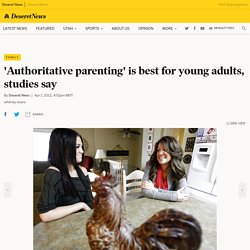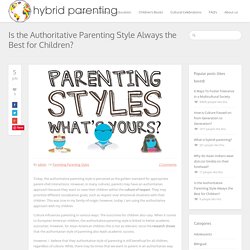

The characteristics and outcomes Authoritative Parenting. © 2010 - 2017 Gwen Dewar, Ph.D., all rights reserved What is authoritative parenting?

The authoritative parenting style is an approach to child-rearing that combines warmth, sensitivity, and the setting of limits. Parents use positive reinforcement and reasoning to guide children. They avoid resorting to threats or punishments. This approach is common in educated, middle class families, and linked with superior child outcomes throughout the world. Kids raised by authoritative parents are more likely to become independent, self-reliant, socially accepted, academically successful, and well-behaved. They are less likely to report depression and anxiety, and less likely to engage in antisocial behavior like delinquency and drug use.
Research suggests that having at least one authoritative parent can make a big difference (Fletcher et al 1999). But what exactly sets the authoritative parenting style apart? Here is an overview. The authoritative parenting style: The original definition. How authoritative parenting affects academic achievements. The Influence of Authoritative Parenting During Adolescence on Depressive Symptoms in Young Adulthood Examining the Mediating Roles of Self.
Journal Article: Authoritative Parenting, School Involvement, and Encouragement to Succeed. A case study on Authoritative Parenting by Deseret News. Ryan and Wendy Heath are raising a family in Sandy.

They live with their three teenagers in a quiet neighborhood. Their oldest, 17-year-old Emily, is a junior in high school and already making plans for college. Her parents are preparing to support her financially through this transition. But if she decides to skip college and head out on her own, she knows her parents will withhold financial support as a result. Giving their children choices is important to the Heaths. "I certainly knew what their ideal was but there was never any discussion," Wendy Heath said.
The Heaths follow a parenting style associated with positive outcomes in children and emerging adults. A growing body of research has found that children raised in that environment have more positive outcomes than their peers whose parents are either more controlling or more permissive. Families nationwide are turning to authoritative parenting as research continues to show the benefits of the method. Email: wevans@desnews.com. An introductory video on Authoritative Parenting. Authoritarian Vs. Authoritative Parenting Styles. Is always authoritative the optimum parenting style Evidence from Spanish families. Is the Authoritative Parenting Style Always the Best for Children? Today, the authoritative parenting style is perceived as the golden standard for appropriate parent-chid interactions.

However, in many cultures, parents may have an authoritarian approach because they want to raise their children within the culture of respect. They may prioritize different socialization goals, such as respect over emotional closeness with their children. This was true in my family-of-origin; however, today, I am using the authoritative approach with my children. Culture influences parenting in various ways. The outcomes for children also vary. However, I believe that they authoritative style of parenting is still beneficial for all children, regardless of culture.
Background on Parenting Styles The parenting styles emerged in the early 1960s by psychologist Diane Baumrind. The authoritarian style is characteristic of parents who are high in control/ demandingness and low in warmth/responsiveness towards their child. When Culture Intersects with Parenting Styles.